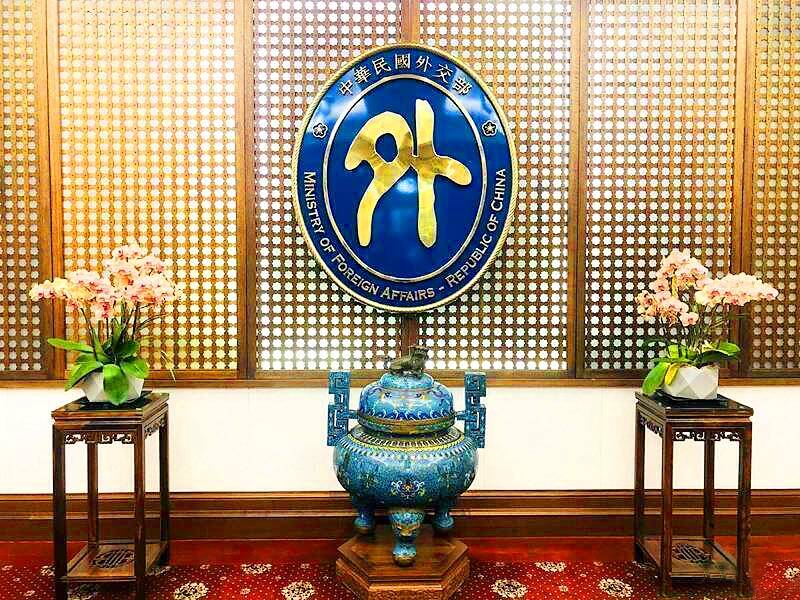Taiwan is willing to send aid, and search and rescue teams to Myanmar and Thailand after a magnitude 7.7 earthquake struck the two countries on Friday, the Ministry of Foreign Affairs said yesterday.
The ministry said it updated its travel advisory on Friday evening, advising people to avoid traveling to Naypyidaw and Mandalay.
The infrastructure in the two cities sustained heavy damage from the main earthquake, it said.

Photo: Taipei Times
In some areas of the two cities, buildings have collapsed, roads have cracked, and there have been power outages and Internet cuts, it said, adding that access by land and air has been difficult, affecting communications with the outside world.
The Taipei Economic and Cultural Office in Myanmar yesterday reported that it reached out to a Taiwanese woman who had been reported missing, and that she was safe, the ministry said.
A hotel a Taiwanese couple was staying at collapsed, it said.
The husband escaped, sustaining mild injuries, and the wife was trapped in the collapsed building with some staff members of the hotel, but they could communicate with people outside, it said, adding that rescue efforts were under way.
Taiwan’s representative offices in Thailand and Myanmar notified the two countries’ governments of the nation’s willingness to send search-and-rescue teams, and the personnel and equipment are ready, it said.
It has been reported that only Yangon International Airport remains available for air traffic in Myanmar, but Mandalay is about 600km from Yangon, and the status of the roads between the two cities is unclear, it said.
Thailand and Myanmar need to clarify the situation in the disaster areas before responding to Taiwan’s offer, it added.
Meanwhile, China Airlines (中華航空) yesterday said that it would ship disaster relief supplies to Thailand and Myanmar free of charge.
The airline in a statement said that it would do its best to assist Taiwanese and other travelers who have been affected, and work with the government and charity organizations to support quake-hit areas.
Additional reporting by CNA

Taiwan is projected to lose a working-age population of about 6.67 million people in two waves of retirement in the coming years, as the nation confronts accelerating demographic decline and a shortage of younger workers to take their place, the Ministry of the Interior said. Taiwan experienced its largest baby boom between 1958 and 1966, when the population grew by 3.78 million, followed by a second surge of 2.89 million between 1976 and 1982, ministry data showed. In 2023, the first of those baby boom generations — those born in the late 1950s and early 1960s — began to enter retirement, triggering

One of two tropical depressions that formed off Taiwan yesterday morning could turn into a moderate typhoon by the weekend, the Central Weather Administration (CWA) said yesterday. Tropical Depression No. 21 formed at 8am about 1,850km off the southeast coast, CWA forecaster Lee Meng-hsuan (李孟軒) said. The weather system is expected to move northwest as it builds momentum, possibly intensifying this weekend into a typhoon, which would be called Mitag, Lee said. The radius of the storm is expected to reach almost 200km, she said. It is forecast to approach the southeast of Taiwan on Monday next week and pass through the Bashi Channel

NO CHANGE: The TRA makes clear that the US does not consider the status of Taiwan to have been determined by WWII-era documents, a former AIT deputy director said The American Institute in Taiwan’s (AIT) comments that World War-II era documents do not determine Taiwan’s political status accurately conveyed the US’ stance, the US Department of State said. An AIT spokesperson on Saturday said that a Chinese official mischaracterized World War II-era documents as stating that Taiwan was ceded to the China. The remarks from the US’ de facto embassy in Taiwan drew criticism from the Ma Ying-jeou Foundation, whose director said the comments put Taiwan in danger. The Chinese-language United Daily News yesterday reported that a US State Department spokesperson confirmed the AIT’s position. They added that the US would continue to

The number of Chinese spouses applying for dependent residency as well as long-term residency in Taiwan has decreased, the Mainland Affairs Council said yesterday, adding that the reduction of Chinese spouses staying or living in Taiwan is only one facet reflecting the general decrease in the number of people willing to get married in Taiwan. The number of Chinese spouses applying for dependent residency last year was 7,123, down by 2,931, or 29.15 percent, from the previous year. The same census showed that the number of Chinese spouses applying for long-term residency and receiving approval last year stood at 2,973, down 1,520,